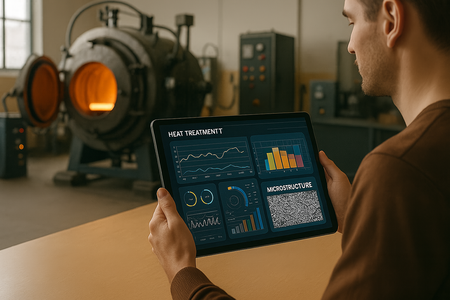
In structural materials, the microstructure formation is triggered using specific thermal- or thermo-chemical heat treatment cycles. The final microstructure derived from a heat treatment is a result of subsequent and parallel transformations which mostly are transient and/or temperature driven. In this Infrastructure Use Case (IUC11), a research data management framework for experimental data with domain-specific semantics was designed. The semantically structured data with its included experimental data are further processed to deliver complete workflows of the samples. These connected ontologies on the same time represents a digital shadow of the sample. The next step is to expand this procedure to other material treatment lines.
| Main requirements: - Ontology for representation of heat treatment courses and transformation in structural materials - Workflow management systems that can be adapted during use (e.g., primary data acquisition, assertion augmentation, heterogeneous post-processing) - Tools for automated data assembly - Data augmentation and condensation for advanced data handling |
| Main Task Area: TA-WLE Other related Task Areas: TA-SAI |
| Possible connections within NFDI: NFDI4Ing, FAIRmat, DataPlant |
| Material/Data: High strength structural materials / time-temperature-transformation relations to microstructures |
| Main Success Scenario: Users can utilize a knowledge graph populated by process and material data to predict microstructures and their alteration by thermochemical heat treatments. Using a graph-based experimental data structure enables a FAIR data storage to allow for a new level of reproducibility and comparability of experimental results from different experimental setups and groups. |
| Added value for the MatWerk community: Concepts for the combined ontologies will be developed, combining thermochemical processing and materials transformation. This provides a general framework for heat treatment representation and the resulting erroneous and intended experimental impacts on materials microstructure. |
This Infrastructure Use Case (IUC11) is preparing methods and tools for advanced data acquisition and handling using automated workflows in complex experimental environment. Specific hardware and software tools are utilized and developed to achieve ease of use for FAIR data agglomeration for materials scientists using electronic lab books.
NFDI-MatWerk
Funded by the Deutsche Forschungsgemeinschaft (DFG, German Research Foundation) under the National Research Data Infrastructure – NFDI 38/1 – project number 460247524.
NFDI-MatWerk
Funded by the Deutsche Forschungsgemeinschaft (DFG, German Research Foundation) under the National Research Data Infrastructure – NFDI 38/1 – project number 460247524.
Subscribe to our newsletter for regular updates about materials science topics!
After subscribing, you will receive an email from us with a confirmation
link.
Only after clicking this link your registration is completed.